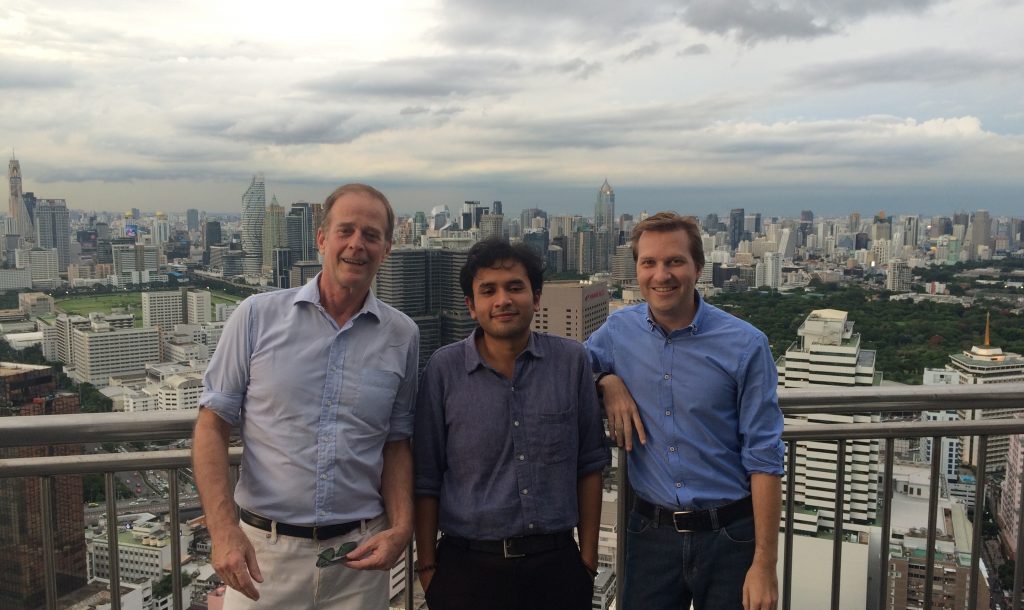Professor Daniel Unger, Ajarn Danny, or more often just “Danny” as many called him, had a profound impact on many of his students at Northern Illinois University (NIU). T. F. Rhoden reflects on his acclaimed scholarship and ever inquisitive mind.
Dr. Daniel H. Unger
1955–2017
The first time that I came across Danny Unger’s name was when I was still a U.S. Peace Corps Volunteer in Sakon Nakhon in the middle 2000s. At the time, I had been placed with a rural subdistrict administrative organization (SAO) office to work on various community-based projects and became interested in the concept of social capital as it works—or doesn’t work—in Thai society. When I spotted a used copy of Danny’s Building Social Capital in Thailand in a Chiang Mai bookstore I picked it up immediately. The dedication to that book read:
To my parents, who gave me life and liberty.
And all the others without whom
I might have finished sooner
but been much less happy.
I felt something of a kindred spirit with the scholar after reading this. I knew that if I were ever to take classes on Thai studies at the university level, I would want to study with another soul who valued the happiness of friendship and family over all else. When I applied to university years later, having Danny Unger on the faculty in the Department of Political Science at NIU was the primary draw for me.
In fall 2011, I had my first class with Danny at NIU. I suspect that most of the political science students in the class balked at a reading list that averaged around 10 journal articles and four books per week. But I absolutely loved it.
The simple, yet powerful idea that “time is fateful” for that course provided me with the courage to propose and research a topic in Thailand that utilises historical progression in the core argument for my dissertation. There are very few practitioners of political science in the American tradition who can knowledgably teach from this perspective. One of my favorite articles by Danny makes free use of this types of analysis: “Sufficiency Economy and the Bourgeois Virtues.” His most recent book with Chandra Mahakanjana Thai Politics: Between Democracy and Its Discontents places the politics of Thailand in the context of centuries-long trends.
Danny also became a personal friend in that fall of 2011. I remember the house party he threw for all the comparative politics students early that semester. Some us of stayed until the sun came up the next morning. DeKalb, Illinois is not the most exciting place, so the willingness of Danny to open his house up to students as a place to gather, unwind, and have a bit of fun became something like a lifeline for many of us when we were not in Southeast Asia for research.
Over the years, Danny Unger touched the lives of many students during his time at Georgetown University and Northern Illinois University in America, and at the National Institute of Development Administration (NIDA) and Thammasat University in Thailand. Since I cannot name all of them here, I want to mention those students whom Danny mentored specifically as chair or co-chair of their doctoral dissertation while at NIU:
- Paul Chambers, 2003, “Factions, Parties, Coalition Change and Cabinet Durability in Thailand: 1979-2001”
- Chandranuj Mahakanjana, 2004, “Municipal Government, Social Capital, and Decentralization in Thailand”
- Sokbunthoeun So, 2009, “Political Economy of Land Registration in Cambodia”
- Punchada Sirivunnabood, 2009, “Local Political Party Branches in Thailand”
- Nicolaus Harjanto, 2010, “Political Party Survival: The Golongan Karya Party and Electoral Politics in Indonesia 1999-2009”
- Vasu Srivarathonbul, 2010, “Controlling Migrant Workers: Thailand’s Perspective”
- Yanyong Innanchai, 2012, “The Roles of the Legislature and Civil Society in Civil-Military Relations”
- Antwon Hampton, 2013, “Rapid Regime Responses: An Urban Regime Analysis of Chicago’s and Miami’s Policy Responses to an Emerging Housing Crisis”
- Pinitbhand Paribatra, 2013, “Thailand’s Relationship With It’s Neighbors: A Study of Border Conflict From 1973 to 2011”
- Srie Honora Ramli, 2013, “From National to Local Elections: An Analysis of the Number of Political Parties Across Electoral Districts in Indonesia”
- Joseph Scanlon, 2015, “Intent Through Event: The Promotion of Identity and Interests at the Olympic Games”
- Thomas F. Rhoden, 2017, “Neither Migrant Nor Refugee: Comparative-Historical Study of Burmese Migration into Thailand”
The last time current NIU students met up with Ajarn Danny in Thailand was after the ENITS & ENITAS Awardee Presentation by the Institute of Thai Studies, Chulalongkorn University last year. He graciously invited many of us out for drinks afterward to review how the presentations went and what new areas of research we were undertaking. As always it was a joy (and a lot of fun!) to be with him.
Those students at Northern Illinois University who studied with Danny Unger and knew him personally are grieved by his loss. His quick wit, warmth, diverse interests, intelligence, and support for us younger scholars will be missed dearly.
T.F. Rhoden is a PhD Candidate at Northern Illinois University. Photo above was taken in July 2016 in Bangkok with Danny Unger and NIU political science doctoral students Iqra Anugrah and T. F. Rhoden.
 Facebook
Facebook  Twitter
Twitter  Soundcloud
Soundcloud  Youtube
Youtube  Rss
Rss 